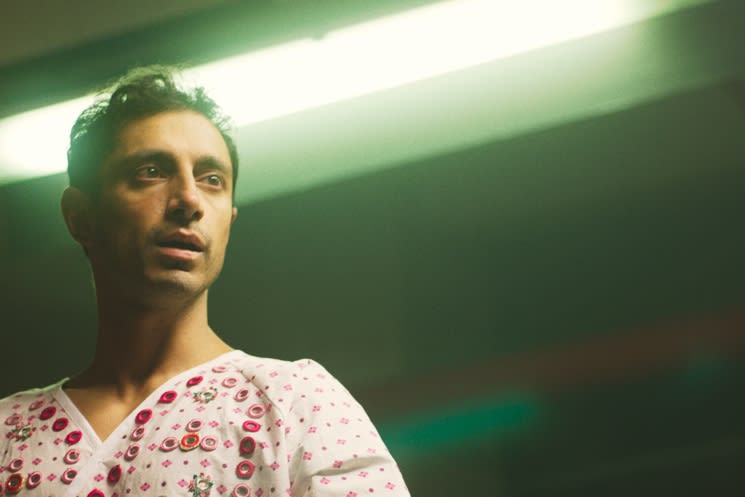When you hear the premise of Mogul Mowgli, you'd be forgiven if your first reaction is: "Didn't Riz Ahmed just do a movie about a musician who develops a health issue?" And while the general elevator pitch of Mogul Mowgli has some cursory similarities with Sound of Metal, it's a film entirely its own.
In his narrative feature debut, director Bassam Tariq tells the story of Zed (Riz Ahmed), a rapper based out of New York City who returns home to London, UK, before setting out on his first world tour. While at home, Zed begins to experience problems with his legs and is diagnosed with an autoimmune disease. While Zed begins to weigh treatment options, he is forced to re-establish familial ties and go on a journey of introspection.
To convey Zed's grief, Tariq uses quick edits and screeching sound design to create anxiety-inducing tension. The tight aspect ratio is distinctive and adds nicely to the claustrophobic nature of Zed's internal thoughts. Most interestingly, Tariq peppers the film with religious imagery, giving audiences a view inside Zed's relationship with Islam.
Ahmed turns in an exceptional performance that shows off his dramatic, comedic and musical chops without missing a beat. Movie after movie, regardless of how the film itself turns out, Ahmed has established himself as one of Hollywood's most dependable actors. As the kids say, "He always understands the assignment."
Not to be outdone is Alyy Khan, who is excellent as Zed's father Bashir. His portrayal of a father hindered by pride and assumed paternal duty is raw and visceral. The chemistry between Khan and Ahmed is very believable, with father and son butting heads but with an undercurrent of love.
Mogul Mowgli pulls from many different genres. Aspects of horror and thriller films are used to emphasize Zed's fears and anger towards his situation. And while not a straight-out comedy, there are many surprisingly humorous moments. But as the film jumps from genre to genre, the lack of focus creates moments that feel hollow.
Tariq and Ahmed have created a film that positively and authentically portrays Muslims and the South Asian diaspora — a massive win in its own right. They should be particularly commended for not taking the time to explain references to cultural practices (e.g. passing things with your right hand), as this film is not here to be a guide into Islamic culture. Rather, it's a complex film about family, self-discovery and acceptance that happens to be told through the eyes of a Muslim British-Pakistani character.
(Photon Films)In his narrative feature debut, director Bassam Tariq tells the story of Zed (Riz Ahmed), a rapper based out of New York City who returns home to London, UK, before setting out on his first world tour. While at home, Zed begins to experience problems with his legs and is diagnosed with an autoimmune disease. While Zed begins to weigh treatment options, he is forced to re-establish familial ties and go on a journey of introspection.
To convey Zed's grief, Tariq uses quick edits and screeching sound design to create anxiety-inducing tension. The tight aspect ratio is distinctive and adds nicely to the claustrophobic nature of Zed's internal thoughts. Most interestingly, Tariq peppers the film with religious imagery, giving audiences a view inside Zed's relationship with Islam.
Ahmed turns in an exceptional performance that shows off his dramatic, comedic and musical chops without missing a beat. Movie after movie, regardless of how the film itself turns out, Ahmed has established himself as one of Hollywood's most dependable actors. As the kids say, "He always understands the assignment."
Not to be outdone is Alyy Khan, who is excellent as Zed's father Bashir. His portrayal of a father hindered by pride and assumed paternal duty is raw and visceral. The chemistry between Khan and Ahmed is very believable, with father and son butting heads but with an undercurrent of love.
Mogul Mowgli pulls from many different genres. Aspects of horror and thriller films are used to emphasize Zed's fears and anger towards his situation. And while not a straight-out comedy, there are many surprisingly humorous moments. But as the film jumps from genre to genre, the lack of focus creates moments that feel hollow.
Tariq and Ahmed have created a film that positively and authentically portrays Muslims and the South Asian diaspora — a massive win in its own right. They should be particularly commended for not taking the time to explain references to cultural practices (e.g. passing things with your right hand), as this film is not here to be a guide into Islamic culture. Rather, it's a complex film about family, self-discovery and acceptance that happens to be told through the eyes of a Muslim British-Pakistani character.




